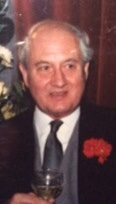Reginald Secondé
(diplomat) | |
|---|---|
 | |
| Born | 28 July 1922 |
| Died | 26 October 2017 (Age 95) |
| Nationality | UK |
| Alma mater | Beaumont College, King's College (Cambridge) |
| Spouse | Catherine Penelope Sneyd-Kynnersley |
British diplomat who was Ambassador to Chile at the time of the 1973 Chilean coup d'état.
| |
Reginald Louis Secondé KCMG CVO was a British diplomat who was Ambassador to Chile, Romania and Venezuela. He was Ambassador to Chile at the time of the 1973 Chilean coup d'état.
Background and education
He was the son of Lt-Colonel Emile Charles Secondé and Dorothy Kathleen (née Sutherland).[1]
Secondé was educated at Beaumont and King's College, Cambridge. He was a Major in the Coldstream Guards during the Second World War.
On 4 June 1951, he married Catherine Penelope Sneyd-Kynnersley (9 October 1919 – June 2004).
1973 Chile coup
After the 1973 coup, UK ambassador Reginald Secondé was outspoken in his support for Pinochet junta, albeit behind closed doors. He welcomed the prospect of Pinochet "[imposing] a period of sensible, orderly government," and said the nationwide ban on political activity was "for the time being, no loss."[2][3]
Shortly after the coup, Secondé met the Chilean government's new Foreign Minister, Admiral Huerta. Top of the agenda was getting Huerta to agree on statement Edward Heath's Conservative government could issue to "reassure public opinion at home," while making clear the administration privately "understood the motives of the armed forces, intervention and problems facing the military government." – diplomatic language for support for the junta.[2]
On October 1, in a lengthy dispatch reflecting on the state of Chile three weeks after the coup, Secondé celebrated the junta’s victory, noting "the final seal of failure" had been put on Allende's socialist experiment, which had "obvious advantages for the West." In essence, Pinochet’s government "[suited] British interests much better than its predecessor.[3]" He added:
Five months ago it seemed possible Chile would follow Cuba, with all the consequences for Latin America that would follow. Moreover, there was a danger a successful outcome to the Chilean experiment would have repercussions beyond Latin America.[3]
Reginald Secondé went to become British ambassador to Romania and Venezuela.